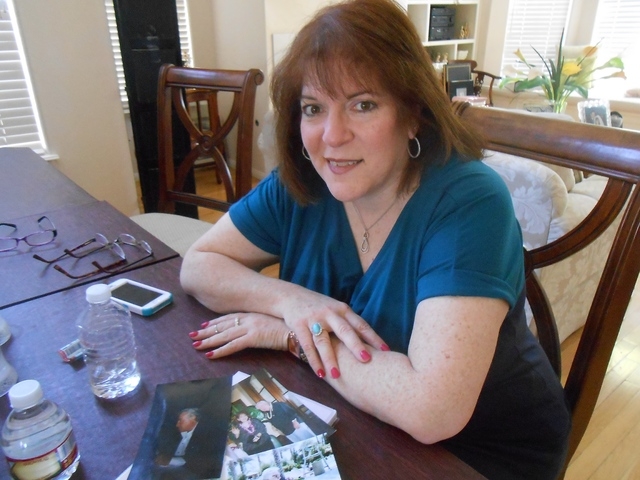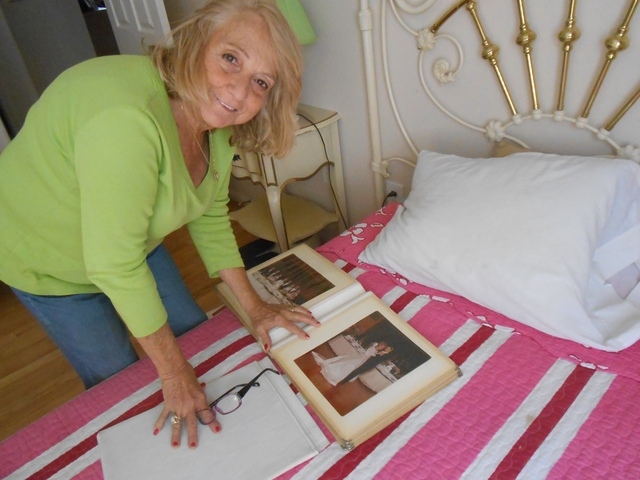Dealing with losing a loved one an individual process for all
People have different ways of coping with the death of a loved one. But almost all agree: It’s a process.
The British Psychological Society notes that the shock of the news leaves one’s world upside down, that “there can be a sense that time is standing still, or that your world is spiralling out of control. People have described feeling as if they are in a dream, where nothing feels real but yet they are still able to function normally. Often people find that their thoughts are fragmented as they grapple with the devastation.”
Joan Sand knows the feeling. Her husband, Jack, died on Aug. 7, 2012. He was buried in California, and she stayed there with family for an extra month, trying to cope. When she returned to Las Vegas, it was to a silent home suddenly devoid of laughter.
“Even though he’d been in the hospital, you’re never prepared (for death),” she said. “You’re thinking, ‘He’ll make it.’ You’re in denial, that your situation is different.”
They would have been married 53 years. It took a while before she could bring herself to pack his clothes and give them away. She kept his bathrobe, pressing her face into it to breathe his scent. Sand said that going to bed at night, with only empty sheets where her husband should have been, was the hardest.
“I remember going to the grocery store for the first time, and it hit me in the cereal aisle, in front of the corn flakes,” she said of breaking down in public. “He always had corn flakes. I didn’t know what to buy for me. Even now, I feel in my heart that I’m still married. …I still wear his wedding ring.”
Those on the outside can never truly understand what the surviving spouse is undergoing, but human nature wants to make things better. So, what do you say to a friend or neighbor who lost a loved one?
“What can they say (that makes it better)?” said Larry Kohen, who lost his wife, Gloria, 14 years ago to complications of diabetes. “Nothing. There’s nothing they can say. It’s nice for people to say, ‘If you need any help, call me.’ But you’re not going to call them because they have their own life.”
Kohen cleared out his wife’s belongings about two weeks after the burial. He began attending singles groups to be social. He said men are more realistic about coping with loss, but that didn’t mean he didn’t still feel the hurt of losing her.
Sand said that she appreciated it when people asked how she was doing and if she needed anything. Like Kohen, she attends a bereavement group, which is slated for 10:30 a.m. the first Wednesday of each month at Temple Beth Sholom, 10700 Havenwood Lane. Meetings are scheduled for Aug. 27, Sept. 10, Oct. 1, Oct. 15, Oct. 29, Nov. 12 and Nov. 26.
For more information, email vegasrita1@aol.com or call 702-596-4321.
Sand said attending the group has helped.
“Now I’m learning to create my own world,” Sand said.
Rita Tell has run the group since 2004, relying on her background in psychology to help people open up about their loss. One of the things she tells people is that upon waking each day, they should think of something that makes them happy.
“Positive, give them something positive,” she said.
She has them list their hobbies, then list the things they hadn’t gotten around to doing, such as taking piano lessons or learning a new language. Tell advises them that it’s normal to feel uncomfortable around friends who are couples.
She tells them that starting a new relationship after losing a spouse is a separate issue, not to be judged.
“One thing has nothing to do with the other,” she said. “(Your lost spouse) was a different life. You can’t compare them.”
She knows what they’re going through. Tell lost her own husband, Donald, in 2000. They’d been a couple since she was 16 and had married in 1961. After his death, she learned not to put on makeup before going some place because she’d invariably cry in the car. Only after she arrived, parked and pulled herself together, would she apply her makeup.
Tell said men often undergo the transition to healing faster than women.
“We’ll have guys who come in who would cry and weep over their wives, and five minutes later, they’re asking about singles groups,” she said.
The group she leads has as many as 40 attendees. Most are 50 or older.
Susan Sanders attends the same bereavement group. She was 53 when her husband Jules, whom she’d been with for nearly 25 years, died on Aug. 4, 2009. He’d fallen sick the week before, went to the doctor’s office and was diagnosed with stage four colon cancer, a shock to them both. Jules was admitted to the hospital and almost immediately fell into a coma. All signs showed he would never recover.
“I had to make the decision to pull the plug,” she said of that week. “It’ll stay with me for the rest of my life, even though you know there’s no other place to go. I could hardly sign the paper. I was shaking like a leaf. …The first night (going to bed), it was brutal. We’d always held hands when we went to sleep.”
She said the first year was a blur, but the pain of losing him was like it was yesterday.
Tell said that nothing anyone can say will make it better, that grieving is a process one must undergo.
Family Institute of Nevada, 3663 E. Sunset Road, Suite 102, holds special meetings dealing with loss. On June 26, after Las Vegas was reeling from having two of its police officers ambushed and killed and an innocent bystander shot and killed, it offered a seminar, Dealing With Feelings of Grief and Loss of Control.
“An air of sadness permeates the community; and for many a sense of unrest, sadness and profound loss remains, and even though most did not know any of the victims, they feel like victims themselves. The core of our sense of well being has been altered,” the institute said in a statement.
The nonprofit counseling agency offers a series of presentations every other month focusing on When Bad Things Happen. The planned August presentation is focusing on Children and the Grief Process. The presentations are free, and seats are available by calling 702-280-7689.
Contact Summerlin Area View reporter Jan Hogan at jhogan@viewnews.com or 702-387-2949.
This is the first story in a three-part series on bereavement support groups and the grieving process. The next installment, which looks at the denial part of the grieving process and how to move past it, is scheduled to run in the July 31 Views.






























